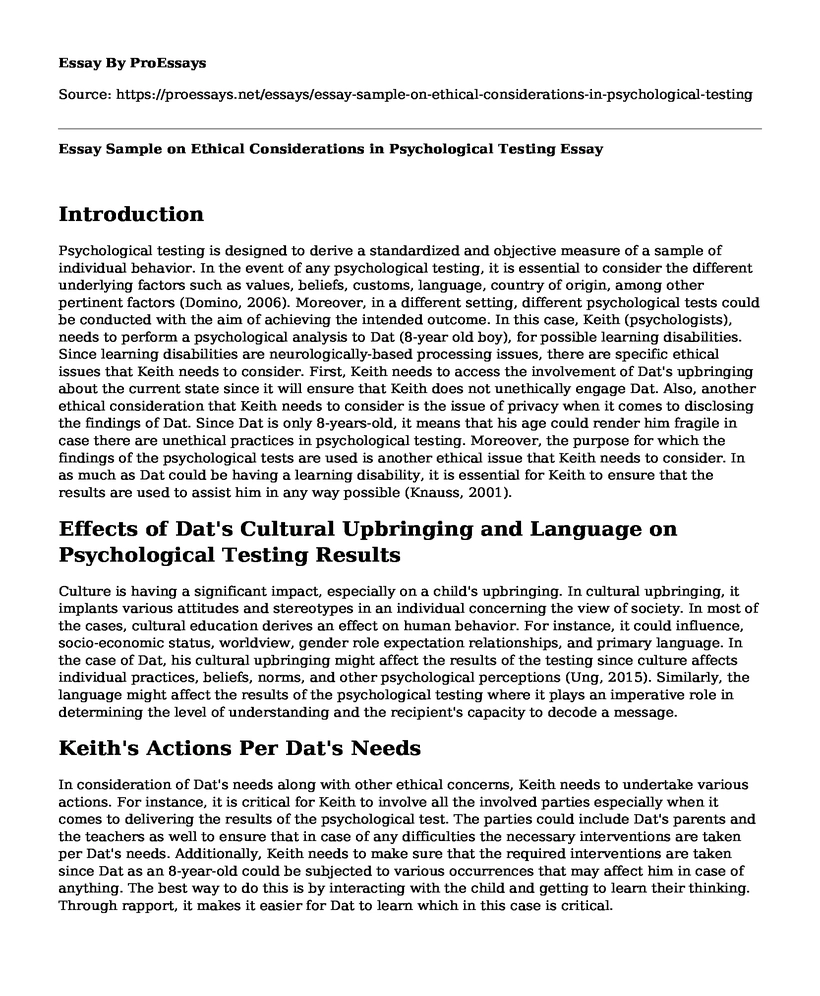Introduction
Psychological testing is designed to derive a standardized and objective measure of a sample of individual behavior. In the event of any psychological testing, it is essential to consider the different underlying factors such as values, beliefs, customs, language, country of origin, among other pertinent factors (Domino, 2006). Moreover, in a different setting, different psychological tests could be conducted with the aim of achieving the intended outcome. In this case, Keith (psychologists), needs to perform a psychological analysis to Dat (8-year old boy), for possible learning disabilities. Since learning disabilities are neurologically-based processing issues, there are specific ethical issues that Keith needs to consider. First, Keith needs to access the involvement of Dat's upbringing about the current state since it will ensure that Keith does not unethically engage Dat. Also, another ethical consideration that Keith needs to consider is the issue of privacy when it comes to disclosing the findings of Dat. Since Dat is only 8-years-old, it means that his age could render him fragile in case there are unethical practices in psychological testing. Moreover, the purpose for which the findings of the psychological tests are used is another ethical issue that Keith needs to consider. In as much as Dat could be having a learning disability, it is essential for Keith to ensure that the results are used to assist him in any way possible (Knauss, 2001).
Effects of Dat's Cultural Upbringing and Language on Psychological Testing Results
Culture is having a significant impact, especially on a child's upbringing. In cultural upbringing, it implants various attitudes and stereotypes in an individual concerning the view of society. In most of the cases, cultural education derives an effect on human behavior. For instance, it could influence, socio-economic status, worldview, gender role expectation relationships, and primary language. In the case of Dat, his cultural upbringing might affect the results of the testing since culture affects individual practices, beliefs, norms, and other psychological perceptions (Ung, 2015). Similarly, the language might affect the results of the psychological testing where it plays an imperative role in determining the level of understanding and the recipient's capacity to decode a message.
Keith's Actions Per Dat's Needs
In consideration of Dat's needs along with other ethical concerns, Keith needs to undertake various actions. For instance, it is critical for Keith to involve all the involved parties especially when it comes to delivering the results of the psychological test. The parties could include Dat's parents and the teachers as well to ensure that in case of any difficulties the necessary interventions are taken per Dat's needs. Additionally, Keith needs to make sure that the required interventions are taken since Dat as an 8-year-old could be subjected to various occurrences that may affect him in case of anything. The best way to do this is by interacting with the child and getting to learn their thinking. Through rapport, it makes it easier for Dat to learn which in this case is critical.
Impacts and Solutions of Testing Results on Dat's Future
The testing results play a significant role in explaining various issues concerning Dat's possibility of having learning disabilities. As far as the results are involved it essential to maintain that every significant occurrence is assessed that could affect or impact the solutions of the testing results. Also, the testing result has an underlying impact on Dat's future whereby in case of any learning disabilities, they deliver far-reaching impacts in learning and development. Correspondingly, it is critical for the psychologist to make the necessary measures and intervention to ensure that Dat acquires essential to aid in education and overall development. Thus, these occurrences and interventions will deliver an influence on future learning prospects to the good of Dat.
References
Domino, M. L. (2006). Psychological testing: An introduction. Cambridge University Press.
Knauss, L. K. (2001). Ethical issues in psychological assessment in school settings. Journal of Personality Assessment, 77(2), 231-241, DOI: 10.1207/S15327752JPA7702_06
Ung, S. (2015). Integrating culture into psychological research. APS Observer, 28(7).
Cite this page
Essay Sample on Ethical Considerations in Psychological Testing. (2022, Nov 24). Retrieved from https://proessays.net/essays/essay-sample-on-ethical-considerations-in-psychological-testing
If you are the original author of this essay and no longer wish to have it published on the ProEssays website, please click below to request its removal:
- Psychology Essay: Obsessive-Compulsive and Trauma-Related Disorders
- The Sociology of Crime and Deviance - Research Paper
- ADHD Symptoms and Treatment Paper Example
- Essay Sample on Agreed-Upon Focus of Therapy for Kalia
- Essay Sample on Myopia and ADHD
- Ageing and Ethnicity Paper Example
- Essay on Nurturing Emotional Resilience: A Parent's Guide to Addressing and Preventing Drug Abuse in Youth







